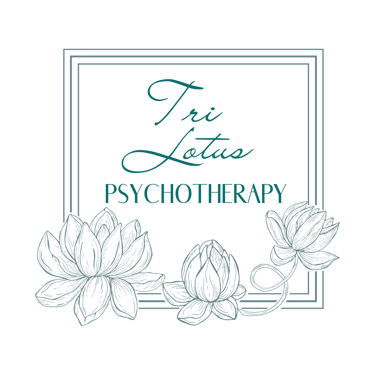NOW ACCEPTING NEW CLIENTS: In-Person in Calgary & Online across Alberta Book a Free 20min Introductory Call! CLIENT LOGIN
Understanding Love Languages: Deepening Connection Through Communication
This blog post breaks down the five love languages and explains how understanding both your own and your partner’s love language can improve connection, communication, and relationship satisfaction. It includes practical tips for identifying love languages, real-life examples of how to use them, and guidance for bringing them into daily life. The post also highlights how couples therapy can support partners in using this framework to strengthen their relationship.
RELATIONSHIP TIPS
Tri Lotus Psychotherapy
5/12/20254 min read


What Are the Five Love Languages?
Have you ever felt like you’re speaking a different language from your partner? You might actually be - at least when it comes to love.
Dr. Gary Chapman identified five “love languages, " which can also be referred to how we give and receive love in relationships. Understanding these languages and how both you and your partner give and receive love is a great way to increase connection and strengthen your relationship.
Why are the Five Love Languages Important?
There are five primary love languages: words of affirmation, acts of service, receiving gifts, quality time, and physical touch. Each individual may resonate with one or multiple languages, which may impact how they express and receive affection. For instance, a partner who thrives on words of affirmation may feel neglected if their partner primarily shows love through acts of service, as it may not register as emotional support.
Understanding your partner's love language is so important for creating a deeper emotional connection and feeling more satisfied in your relationship. Often, individuals mistakenly assume that their own love language mirrors that of their partner, leading to miscommunication and unmet emotional needs. Recognizing and acknowledging differing love languages paves the way for more effective communication and stronger bonds.
The Five Love Languages:
Words of Affirmation
These are the verbal or written comments we make to our partner that show them we care. These could be, love notes, compliments, “I’m proud of you” moments etc. Those who prefer this love language feel closest through kind, encouraging words.
Quality Time
With this love language, undivided attention is essential! Think long convos, date nights, or cozy nights in - anything where your focus is them.
Acts of Service
With acts of service, actions are more important words. Whether it’s doing the dishes, washing their car or grabbing their coffee order, love looks like helping out.
Receiving Gifts
For gift giving, it’s not about price - it’s the thought. A small surprise or meaningful token can give the message to your partner, “I was thinking about you.”
Physical Touch
Hugs, kisses, holding hands, cuddling - touch equals connection for those that desire physical touch.
Why Your Own Love Language Matters
Knowing how you feel loved is a game-changer. It helps you communicate what you need and notice when you are getting it! Often times our partners will give love in the way receive it - so being able to communicate with them how you feel loved takes the guesswork out of it!
Not sure what your love language is?
Think about the moments you’ve felt most loved. Was it a kind word? A thoughtful gift? A helping hand?
Google the 5 Love Languages quiz and take it!
Know that you may receive love most in a few of the love languages - it doesn't need to be just one. However, ranking them can be helpful.
Don’t overthink it - your top love language might shift over time. That’s normal!
Understanding Your Partner’s Love Language
Here’s the twist: as mentioned above, your partner’s love language might be totally different than yours.
You might say “I love you” (words), while they’d rather you just take out the trash (acts of service). This can lead to a disconnect.
Here’s how to figure theirs out:
Ask! Start with sharing that you want to ensure they feel loved by you, spark a casual conversation about it or take the quiz together.
Watch how they show love. People often give love the way they want to receive it.
Try stuff out. Plan a date, leave a note, offer help - notice what makes them happy or show affection towards you.
Bringing Love Languages Into Daily Life
Once you both know your love languages, you can turn that insight into action.
Quick ideas for each language:
Words of Affirmation: Leave cute sticky notes. Write them a love letter. Text them something nice. Say “thank you” often.
Quality Time: Schedule a no-phone dinner or weekend walk. Have a weekly date night where you each take turns planning it. Plan daily true connection time - sit on the couch with coffee or tea and just talk.
Acts of Service: Knock a chore off their list without being asked. Wash their car or fill it with gas. Make them lunch
Receiving Gifts: Surprise them with their favourite snack or a tiny trinket “just because.” If you go away on vacation with your friends or a work trip, come back with a tiny souvenir that shows you were thinking of them.
Physical Touch: Hold their hand in public. Give a goodbye hug that lingers. Create rituals of connection that include touch such as, a daily goodbye kiss in the mornings, cuddling on the couch each night, or holding each other briefly before bed (even if you're not going to sleep at the same time).
Bonus Tip: schedule a weekly check-in conversation where you reflect on the week together and how loved each of you felt. Savour the great moments and make a plan to improve on any challenges for the following week!
Need Help Using This in Real Life?
If this all sounds good but you’re not sure where to start or you keep missing each other’s signals - couples or marriage therapy can help.
If you're searching for a "marriage therapist near me," you've landed at the right place. At Tri Lotus Psychotherapy, our Calgary couples therapists help couples tune into each other’s love languages and build stronger, more connected relationships. Whether it’s through Calgary couples counselling or curated exercises, you have our support. We also offer complimentary 20 minute consultation calls to learn more and answer any questions you may have about the marriage therapy, premarital counselling, or couples therapy process.
Let's Connect
Please fill out the form to request an initial appointment
or complimentary introductory call
Contact
hello@trilotustherapy.com
Clinic Hours
Monday: 5:00pm to 8:00pm
Tuesday: 1:00pm to 8:00pm
Wednesday: 8:00am to 8:00pm
Thursday: 8:00am to 8:00pm
Friday: 11:30am to 4:30pm
Saturday: 9:00am to 3:00pm
Copyright © 2025 by Tri Lotus Psychotherapy - All Rights Reserved


Land Acknowledgment: I gratefully acknowledge and honour that where I live, work and play is within the traditional territories of the people of the Treaty 7 region in Southern Alberta, which includes the Blackfoot Confederacy (comprising the Siksika, Piikani, and Kainai First Nations) as well as the Tsuut’ina First Nation, and the Stoney Nakoda (including the Chiniki, Bearspaw, and Wesley First Nations); and Métis Nation of Alberta, Region 3. The traditional Blackfoot name of this place is “Mohkinstsis”, which is also known now as Calgary.

